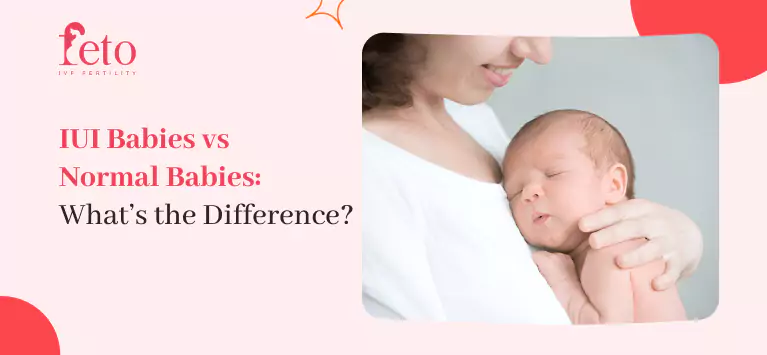
IUI Babies vs Normal Babies: What’s the Difference?
When couples struggle to conceive naturally, medical advancements like IUI (Intrauterine Insemination) offer a hopeful solution.
However, a common question arises — Are IUI babies different from normal babies?
Let us get into the differences, similarities, and misconceptions between IUI babies and naturally conceived babies, to help you understand the truth from both a medical and emotional perspective.
What Is IUI?
Intrauterine Insemination (IUI) is a fertility treatment where sperm is placed directly into a woman’s uterus during ovulation. It boosts the likelihood of fertilization, particularly for couples facing issues like low sperm count, unexplained infertility, or problems with cervical mucus.
Unlike IVF, IUI is less invasive, more affordable, and often the first fertility treatment recommended by doctors.
Who Chooses IUI?
Many couples or individuals consider IUI due to:
- Male fertility issues
- Cervical problems
- Ovulation disorders
- Same-sex couples or single mothers by choice
- Unexplained infertility
The aim is straightforward: to mimic the natural conditions of conception as closely as possible.
IUI Babies vs Normal Babies
Are they any different?
Let’s break down the facts and myths when it comes to comparing IUI babies and normal (naturally conceived) babies:
Genetics and Development
IUI babies are genetically identical to those conceived naturally. The egg and sperm come from the intended parents (unless donors are used), which means the baby inherits the same DNA as a normal baby.
Medical experts confirm that IUI babies follow the same growth and development patterns in the womb and after birth. They reach the same milestones — walking, talking, teething — like any other child.
There is no genetic difference between IUI babies and normal babies.
Pregnancy and Birth Outcomes
Pregnancies conceived via IUI are medically monitored, but they typically progress just like natural pregnancies. The method of conception doesn’t affect how the pregnancy continues or how the baby is born.
However, if multiple eggs are released due to fertility medications, the chances of twin or multiple births slightly increase with IUI. However, the majority of IUI pregnancies result in a singleton — meaning just one baby.
Pregnancy outcomes are similar, though there’s a slightly higher chance of multiples in IUI.
Health at Birth
Extensive studies show no significant difference in the health of IUI babies vs normal babies. The rates of birth defects or complications are not higher in babies born through IUI.
Doctors closely monitor pregnancies resulting from IUI due to their assisted nature, but this is just a precaution — not because of any inherent risk.
IUI babies are typically born just as healthy as those conceived naturally.
Emotional Bonding
Some parents worry if the use of medical intervention might affect the emotional bond with the baby. The truth is, whether a baby is born through IUI or naturally, the parent-child bond develops through love, care, and connection.
Many IUI parents feel an even stronger bond because of the emotional journey and patience it took to conceive.
IUI does not reduce parental bonding — if anything, it may deepen it.
Social Myths Around IUI Babies
Myth: IUI babies are “artificial” or “not natural.”
Truth: IUI only assists the sperm in reaching the egg. The rest of the process — fertilization, embryo development, pregnancy — happens naturally inside the body.
There is nothing artificial about the baby.
Myth: IUI babies are weaker.
Truth: There is no scientific basis for this. IUI babies are just as strong and capable as their peers in every way — physically, emotionally, and intellectually.
IUI babies are normal, healthy, and just as natural as any other baby.
Are There Any Risks in IUI?
IUI is generally safe, but like any medical procedure, there are minor risks such as:
- Mild cramping or spotting after the procedure
- Higher chance of multiples (twins, triplets) if fertility drugs are used
- Ovarian hyperstimulation in rare cases
However, these are well-managed by fertility specialists and don’t affect the baby’s normal growth.
Why It’s Important to Educate Society?
There is still stigma and misinformation surrounding assisted reproduction. Understanding that IUI babies and normal babies are not different in any meaningful way helps reduce shame and support families who need medical help to conceive.
Educating ourselves and others can create compassion, acceptance, and a more inclusive society where every child is celebrated no matter how they were conceived.
Final Thoughts
The differences between IUI babies and normal babies are virtually nonexistent when it comes to genetics, health, and development. The method of conception may vary, but the end result is the same, a beautiful, healthy baby.
If you or someone you know is considering IUI, rest assured: IUI babies are just as normal, loved, and special as any other child.
Frequently Asked Question
Are IUI babies at higher risk of genetic issues?
No. IUI uses the couple’s own sperm and egg (unless donor gametes are used), so there’s no added genetic risk.
Do IUI babies require more medical care?
No. Once pregnancy is confirmed, the care and monitoring are the same as with any typical pregnancy.
Can IUI babies live normal lives?
Absolutely. They go through normal developmental stages and live healthy, active lives.
